What’s an Open Educational Resource (OER)?
Open Educational Resources (OER) are any type of educational material freely available for teachers and students to use, edit, share, and reuse.
Examples of OER include learning content (such as lesson plans, assignments, textbooks, exams, and videos) as well as tools for learning (like software for creating videos and websites, course management systems, word processing programs, and training materials).
Do you want to know more? Visit OER Commons or continue reading below.
Information for Students
- How do OERs benefit me?
-
The first (and most obvious) benefit is that OER materials are freely accessible, meaning no cost to you! This results in a more equitable course, as all students, regardless of their financial situation, have access to the same materials from day one.
Instructors have the flexibility to edit the materials, which benefits you as the OER can be customized to exactly what you and your fellow students need for the particular course.
In addition to OER that might be formally adopted by your instructors for use in your courses, you can also find and utilize OER as additional (free!) study materials.
- How can I find Pitt courses that use OER?
-
It’s very easy! In PeopleSoft
- Go to Class Search.
- Fill in the fields about Term, Campus, Academic Career as you need.
- For the Course Attribute field, select "Course Related Materials" from the dropdown menu.
- For the Course Attribute Value, select "Open Educational Resource" from the dropdown menu.
- Search!
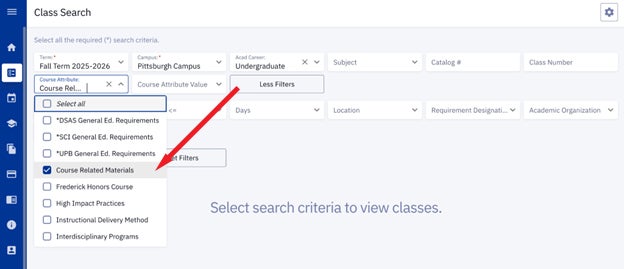
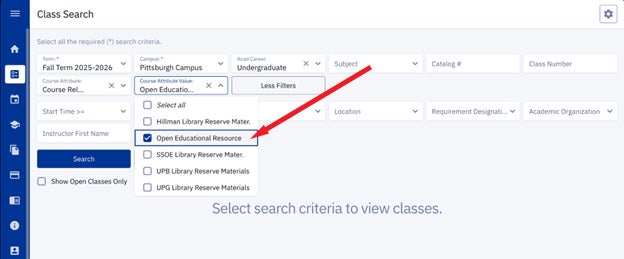
- How can I advocate for OER at Pitt?
-
You can begin by learning more about OER on this website or reading the student advocate toolkit from OER commons.
Once you are more familiar with what OER are, you can then begin a conversation with your instructors. Discuss the impact of textbook costs on you and how their using OER in your course could benefit you. Direct them to the Information for Educators section below for more information.
- What is the Provost’s Standing Committee on OER?
-
In January 2018, the University’s Student Government Board passed a resolution supporting expanded use of Open Educational Resources (OER) and open textbooks as an alternative to expensive textbooks and to decrease the burden of student textbook costs.
In response to the resolution and with an eye on textbook affordability at Pitt, the Provost formed a standing committee.
The standing committee in the Office of the Provost is charged with providing a targeted and sustained OER awareness program. This committee is composed of faculty who teach; representatives from the libraries, University Store, and University Center for Teaching and Learning; and a student representative from the Student Government Board.
For more information on the standing committee’s origins, goals, and progress, read the 2023 Report to the Provost: Provost’s Standing Committee on OER.
Current committee membership:
- Ula Lechtenberg, Learning Design Coordinator, University Library System (Chair)
- Catherine Baldwin, Instruction Services Librarian, Hanley Library, University of Pittsburgh at Bradford
- Christina Frasher, Visiting Assistant Professor, Department of Health & Human Development, School of Education
- Maria Hahn, Senior Teaching Consultant, University Center for Teaching and Learning
- Beta Keramati, Physics Instructor, University of Pittsburgh at Johnstown
- Sera Mathew, Director, Equitable and Inclusive Teaching, University Center for Teaching and Learning
- Chiara Montera, Teaching Assistant Professor in Italian, Department of French and Italian
- Linda O’Reilly, Teaching Associate Professor, Department of Biological Sciences.
- Monica Rattigan, Executive Director of Retail and Logistics Operations
- Sera Thornton, Instructional Design Lead, Health Sciences Library System
- Frank Wilson, Assistant Dean for Academic Affairs, University of Pittsburgh at Greensburg; Interim Associate Dean of Frederick Honors College-Greensburg; Past President of the University Senate
- What are examples of OER use in Pitt courses?
-
OERs have been adopted/adapted/authored for use in Pitt courses in a variety of disciplines. We encourage you to view the examples below and also check out the current and past Nancy Tannery Grant for OER awardees for inspiration.
Examples of OER at Pitt
STEM
- Introduction to Physics, by Beta Keramati
- Pathology Case Study by William Pasculle and Ken Clark.
- See more examples from the School of Medicine
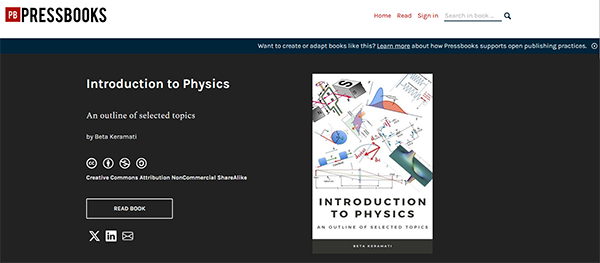
Sample view of book resource on Pressbooks platform.
Languages
- Tra di Noi. Elementary Italian Language & Culture 1, Lorraine Denman & Chiara Montera (You can import it in your Canvas!)
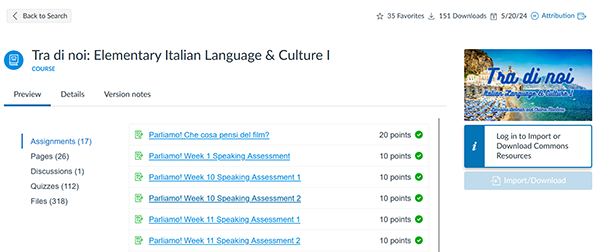
Sample screen from Instructur platform.
Social Sciences- Writing Lesson Plans, Jeanne Burth, Education
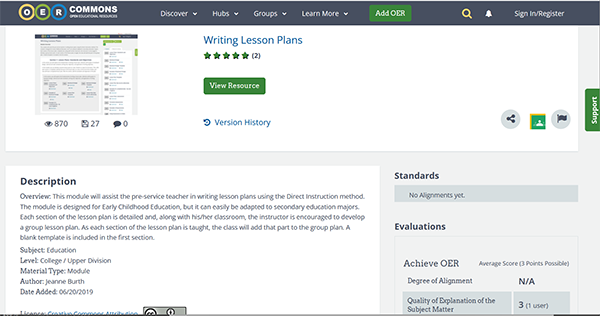
Sample screen from OER Commons platform.
- What does Pitt do to support reducing student textbook costs?
-
Textbook costs are a significant burden to many students, not just at Pitt but nationwide.
Students are skipping purchasing textbooks due to the cost. And they are doing so even though they are concerned that not having the textbook will decrease their success in class.
Students are working extra hours in order to afford textbooks—instead of using those hours for learning.
And, students are choosing between buying food and textbooks. A surprisingly large percentage of students report having skipped meals in order to afford their textbooks. Students facing food insecurity skip buying textbooks more than the average student. This is increasing the inequities in success in our classrooms—the opposite of the direction we’d like to be going in.
So, what is going on at Pitt to work on reducing this burden?
In January 2018, the University’s Student Government Board passed a resolution supporting expanded use of Open Educational Resources (OER) and open textbooks as an alternative to expensive textbooks and to decrease the burden of student textbook costs.
- The Provost’s Standing Committee on OER (see earlier question), formed in 2018, works to increase awareness and adoption of Open Educational Resources – free and open educational resources such as textbooks – in Pitt courses.
- The Nancy Tannery Grant for OER provides funding for faculty to adopt, adapt, or author OER for use in a Pitt course. This grant is funded by the Office of the Provost and administered by the Provost’s Standing Committee on OER.
- Pitt's Student Public Interest Research Groups launched a textbook affordability campaign in Spring 2024.
- Course Reserves is a library service offered to instructors to make course materials available to their students. Materials can include print/physical items, electronic reserves, and media formats. See Course Reserves at ULS Course Reserves at HSLS.
- Inclusive Access is a University Store program that offers deeply discounted digital course materials. Inclusive Access converts physical course materials, such as textbooks, into instantly accessible, interactive and adaptive digital content, while drastically reducing the cost to students. The program’s main goals are to reduce the cost of course materials and to improve educational outcomes for students. The cost of Inclusive Access materials is posted to students’ accounts in PittPAY and appears as a course materials fee on the Account Activity tab. If a student chooses to opt out of the program, the fee is reversed, and the student becomes responsible for acquiring physical copies of any necessary course materials.
Information for Educators
- What is the Provost’s Standing Committee on OER?
-
In January 2018, the University’s Student Government Board passed a resolution supporting expanded use of Open Educational Resources (OER) and open textbooks as an alternative to expensive textbooks and to decrease the burden of student textbook costs.
In response to the resolution and with an eye on textbook affordability at Pitt, the Provost formed a standing committee.
The standing committee in the Office of the Provost is charged with providing a targeted and sustained OER awareness program. This committee is composed of faculty who teach; representatives from the libraries, University Store, and University Center for Teaching and Learning; and a student representative from the Student Government Board.
For more information on the standing committee’s origins, goals, and progress, read the 2023 Report to the Provost: Provost’s Standing Committee on OER.
Current committee membership:
- Ula Lechtenberg, Learning Design Coordinator, University Library System (Chair)
- Catherine Baldwin, Instruction Services Librarian, Hanley Library, University of Pittsburgh at Bradford
- Christina Frasher, Visiting Assistant Professor, Department of Health & Human Development, School of Education
- Maria Hahn, Senior Teaching Consultant, University Center for Teaching and Learning
- Beta Keramati, Physics Instructor, University of Pittsburgh at Johnstown
- Sera Mathew, Director, Equitable and Inclusive Teaching, University Center for Teaching and Learning
- Chiara Montera, Teaching Assistant Professor in Italian, Department of French and Italian
- Linda O’Reilly, Teaching Associate Professor, Department of Biological Sciences.
- Monica Rattigan, Executive Director of Retail and Logistics Operations
- Sera Thornton, Instructional Design Lead, Health Sciences Library System
- Frank Wilson, Assistant Dean for Academic Affairs, University of Pittsburgh at Greensburg; Interim Associate Dean of Frederick Honors College-Greensburg; Past President of the University Senate
- How do OERs benefit me?
-
Cost-free textbook: Decreases financial burden and ensures equitable access of resources for all your students. Students will have access to your course materials, whether they could afford to spend money on them or not.
Improved alignment of the textbook to your course: OERs are free to reuse, and remix (edit). Unlike with a traditional publisher-purchased textbook, you have the flexibility to edit the text, and swap in chapters from different OER textbooks to build a unified streamlined resource which aligns better with your learning objectives and audience.
Streamlined access for your students: OERs can be integrated into Canvas, and accessed easily. Students do not need to get access through a paywall, so there are fewer technical difficulties. Also, unlike some publisher-purchased digital course materials, your students maintain access in perpetuity.
Support to build or adopt OER for your course: You can author an OER, whether that be an entire textbook, or a single chapter, worksheets, illustrations, videos, etc. The University provides monetary support in the form of the Nancy Tannery Grant for OER. The University also has many sources of non-monetary support for you in your OER project. - What are examples of OER use in Pitt courses?
-
OERs have been adopted/adapted/authored for use in Pitt courses in a variety of disciplines. We encourage you to view the examples below and also check out the current and past Nancy Tannery Grant for OER awardees for inspiration.
Examples of OER at Pitt
STEM
- Introduction to Physics, by Beta Keramati
- Pathology Case Study by William Pasculle and Ken Clark.
- See more examples from the School of Medicine

Sample view of book resource on Pressbooks platform.
Languages
- Tra di Noi. Elementary Italian Language & Culture 1, Lorraine Denman & Chiara Montera (You can import it in your Canvas!)

Sample screen from Instructur platform.
Social Sciences- Writing Lesson Plans, Jeanne Burth, Education

Sample screen from OER Commons platform.
- Where can I find existing OER to use in the courses I teach?
-
We encourage you to browse our website here and also consider enrolling yourself in our OER Canvas site as well.
ULS has extensive information available on places to search for existing OER in their OER reference guide. Among the resources they mention are:
- The OER Commons is a helpful place to begin searching for existing OER that you may want to use or adapt for your course. The site offers the option to search by subject or institution.
- Merlot offers OER course materials, learning resources and more.
- The Open Textbook Library is a further resource for textbook specific materials
- as well as LibreTexts.
Have you checked these resources out and are still having trouble finding the OER you need? Ask your librarian for help! Email ULS-OER@pitt.edu.
- What’s the Nancy Tannery Grant for OER and how can I apply?
-
The Nancy Tannery Grant for OER is an internal Pitt grant program offered annually since 2018, which supports faculty through funding to adapt, adopt, and create OER for use in Pitt courses.
This grant is funded by the Office of the Provost and administered by the Provost’s Standing Committee on OER [link to question]. The announcement for this grant opportunity is typically published in February each year.
Eighty-eight proposals have been funded to date (2025), ranging from replacing course use of a publisher’s textbook with a pre-existing OER to generating and publishing an entire OER textbook.
Nancy Tannery was the inaugural chair of the Provost’s Standing Committee on OER and a passionate advocate for OER and addressing student textbook financial burden at Pitt.
- Where can I get guidance/support at Pitt for using/creating OER?
-
A great place to find support in using OERs is through our Pitt libraries and their helpful OER reference guide. Also, our Center for Teaching and Learning experienced consultants can offer support and guidance on how to integrate OERs in your courses and assignments.
If you are interested in adopting, adapting, or authoring an OER, the Provost’s Standing Committee on OER can offer resources and support throughout the process. We encourage you to begin your consultations with your library and the Teaching Center. The librarians can support you in finding OERs and have information on OER specifics. The Teaching Center offers consultations on the pedagogical considerations of OERs. In addition, the Provost’s Standing Committee on OER offers open office hours during the grant application window in which you can consult, ask questions and get feedback on your grant application process.
For financial support, if you want to adopt/adapt/author an OER for use in a Pitt course, consider applying for the Nancy Tannery Grant for OER.
Get information about OER licensing.
Request a consultation with the Teaching Center to ask pedagogical questions and find out about how you can integrate OERs and make your course more inclusive
Faculty can use the table below to see which Pitt areas are available to help during different stages in your OER development/adoption process.
Stage Example Questions Teaching Center Libraries Bookstore Introduction What is an OER?
Why would I want to use or make one?X X X Funding Where can I apply for funding to make / adopt OER?
How can I improve my OER-related project proposal?X X Discovery What OER or free resources exist in my subject area? X X Identification Is this thing actually an OER?
If not, is it still free for students to access?X Licensing What is a Creative Commons license?
How may I use, change, and share this OER?
How may others use, change, and share my OER?X Evaluation How do I evaluate whether an educational resource is likely to be effective for my learning objectives? X Creation How do I create an effective educational resource?
How do I modify an existing educational resource to be more effective?X Course Integration How do I effectively integrate an educational resource into my course? X Sharing How can I make my existing resource into an OER?
Where/how can I publish/share the OER I have created?X Communication How do I make my students or prospective students aware that my course uses OERs? X Assessment of Learning How do I assess whether an educational resource is effective in supporting my students' learning?
How do I apply this knowledge to improving the educational resource?X Contacts:
Teaching Center: Request a Consultation
Libraries: ULS-OER@pitt.edu
Bookstore: Jvb9@pitt.edu
- What does Pitt do to support reducing student textbook costs?
-
Textbook costs are a significant burden to many students, not just at Pitt but nationwide.
Students are skipping purchasing textbooks due to the cost. And they are doing so even though they are concerned that not having the textbook will decrease their success in class.
Students are working extra hours in order to afford textbooks—instead of using those hours for learning.
And, students are choosing between buying food and textbooks. A surprisingly large percentage of students report having skipped meals in order to afford their textbooks. Students facing food insecurity skip buying textbooks more than the average student. This is increasing the inequities in success in our classrooms—the opposite of the direction we’d like to be going in.
So, what is going on at Pitt to work on reducing this burden?
In January 2018, the University’s Student Government Board passed a resolution supporting expanded use of Open Educational Resources (OER) and open textbooks as an alternative to expensive textbooks and to decrease the burden of student textbook costs.
- The Provost’s Standing Committee on OER (see earlier question), formed in 2018, works to increase awareness and adoption of Open Educational Resources – free and open educational resources such as textbooks – in Pitt courses.
- The Nancy Tannery Grant for OER provides funding for faculty to adopt, adapt, or author OER for use in a Pitt course. This grant is funded by the Office of the Provost and administered by the Provost’s Standing Committee on OER.
- Pitt's Student Public Interest Research Groups launched a textbook affordability campaign in Spring 2024.
- Course Reserves is a library service offered to instructors to make course materials available to their students. Materials can include print/physical items, electronic reserves, and media formats. See Course Reserves at ULS Course Reserves at HSLS.
- Inclusive Access is a University Store program that offers deeply discounted digital course materials. Inclusive Access converts physical course materials, such as textbooks, into instantly accessible, interactive and adaptive digital content, while drastically reducing the cost to students. The program’s main goals are to reduce the cost of course materials and to improve educational outcomes for students. The cost of Inclusive Access materials is posted to students’ accounts in PittPAY and appears as a course materials fee on the Account Activity tab. If a student chooses to opt out of the program, the fee is reversed, and the student becomes responsible for acquiring physical copies of any necessary course materials.
- How can I make it known that my course uses OER?
-
You can offer this information in your syllabus (and be sure to define what an OER is!). Penn State syllabus statement example. We encourage you to emphasize how the materials have been personally designed or adapted to meet students' needs.
You can designate your course as OER or no textbook required on PeopleSoft, so that students can see this designation when looking up courses. In order to add this designation to your course, respond to emails you receive from the University Store about course material adoption prior to the start of term, and choose OERs.
Consider also listing OERs you have authored or adapted on the Pitt OER Repository on OER Commons. Please email the ULS OER team to request that your OER be added to the group.
Or, list on the School of Medicine’s OER Repository on OER Commons if you feel it’s a better fit.
Consider also offering a question on your OMET student feedback surveys to prompt your students to reflect on your use of OER. Learn more about Adding Questions to your Teaching Survey.
